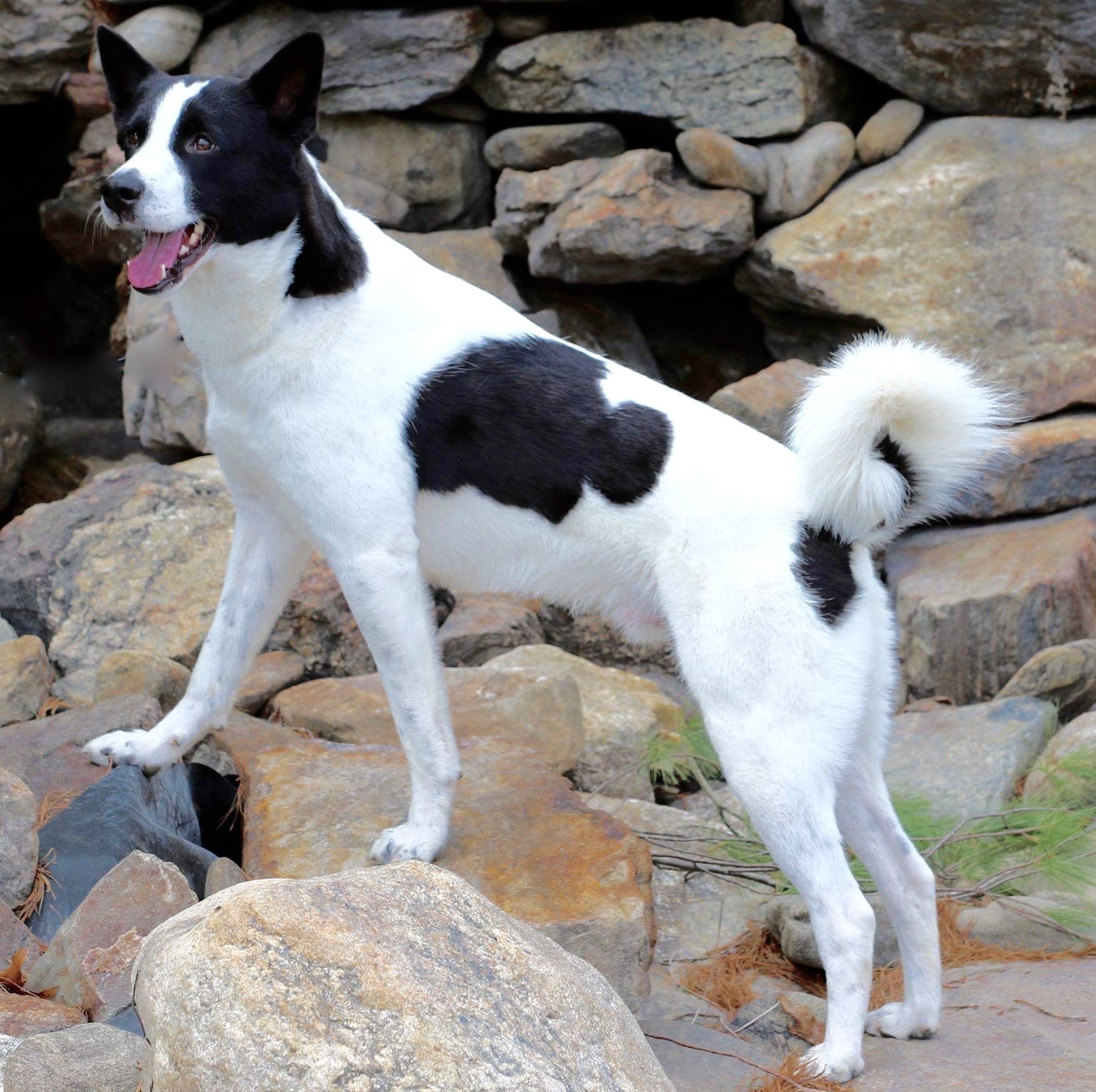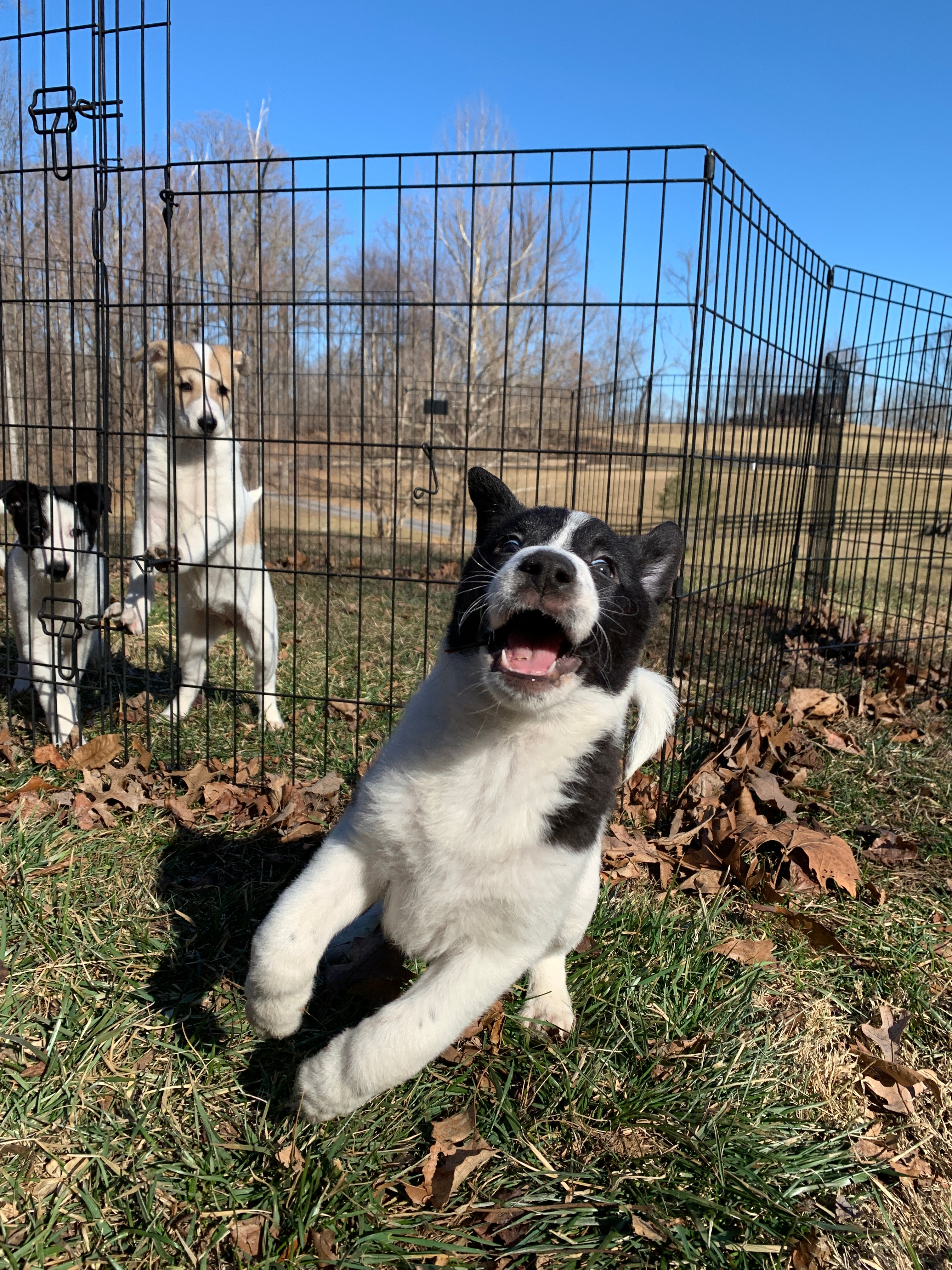Canaan Dog
The Canaan Dog has ancient roots dating back to 2200–2000 BCE, according to the Canaan Dog Club of America (CDCA), and is the national dog of Israel. The breed’s ancestors were called the Pariah Dog, and they were bred as livestock guardians and herders.
These intelligent dogs mesh well with their families but can be more reserved around those they don’t know. The Canaan Dog size falls between 19–24 inches tall, and they weigh 35–55 pounds. The breed’s average lifespan is 12–15 years.
Caring for a Canaan Dog
Canaan Dogs love their people but may not love listening to them all the time. Pet parents should be ready for a strong-willed dog that needs early training and socialization; they do best in homes with experienced pet parents.
Canaan Dogs are dedicated companions with moderate exercise and grooming needs. They need about an hour of exercise every day and consistent mental stimulation to keep their mind occupied. Canaan Dogs have a flat but thick double coat that needs to be brushed a few times each week.
Canaan Dog Health Issues

Canaan Dogs are “one of the healthiest breeds around,” according to the British Canaan Dog Society. But there are a few concerns that pet parents should be aware of, as no dog is guaranteed to have a clean bill of health.
Hip Dysplasia
Hip dysplasia in dogs occurs when the hip joint doesn’t grow as it should and results in a loose joint. If left untreated, this can lead to pain, limping, trouble standing, and arthritis.
Though more common in large breeds, hip dysplasia can affect medium-sized dogs, including the Canaan Dog breed. Management with medications and joint supplements under your vet’s guidance can help dogs with milder cases, but severe hip dysplasia may require surgery.
Progressive Retinal Atrophy (PRA)
Progressive retinal atrophy describes a group of genetic eye conditions that lead to blindness in dogs. Initial signs include a reluctance to go outside at night or into a dark room, clumsiness, and cataracts.
There is no cure, but dogs can adjust to lost eyesight with help from their pet parent and go on living happy, normal lives.
Patella Luxation
Patella luxation is when the kneecap slips out of place due to a shallower-than-normal groove in the femur (thigh bone). Signs include a bunny-hopping gait, a cracking or popping noise from the knee joint, and a recurring limp.
The British Canaan Dog Society says that, while patellar luxation is uncommon in the breed, it is recommended that Canaan Dog breeders test their dogs for this genetic condition.
What To Feed a Canaan Dog
Canaan Dogs need to eat a food aligned with the nutritional standards set by the Association of American Feed Control Officials (AAFCO).
The food must also be made for their life stage: Canaan Dog puppies should eat a puppy food, adults need to eat an adult-formulated food, and seniors can eat a senior diet. Use caution with dog foods labeled “all life stages,” as these are puppy food diets and not ideal for adult or senior pups.
How To Feed a Canaan Dog
Adult Canaan Dogs should eat two meals per day, one in the morning and one in the evening. Canaan Dog puppies should eat more frequently, up to three or four meals every day.
How Much Should You Feed a Canaan Dog?
How much to feed your dog depends on many factors, such as your dog’s weight, body condition score, lifestyle, and health. Talk to your veterinarian about how much food to give your Canaan Dog.
Your AAFCO-approved dog food packaging will also provide guidance on portions.
Nutritional Tips for Canaan Dogs
Dogs eating an AAFCO-approved diet receive all the nutrients they need and won’t need supplementation. However, your vet may prescribe certain dog supplements depending on your pup’s health.
Never give your dog a supplement without your veterinarian’s guidance.
Behavior and Training Tips for Canaan Dogs
Canaan Dog Personality and Temperament

While they are a herding breed, Canaan Dogs don’t have the boundless energy seen in some other herders, such as Border Collies or Australian Shepherds. But this doesn’t mean they’re content to stay inside all day.
Canaan Dogs need a couple of walks a day and love to join their pet parents on a hike or jog, or running an agility course. After their energy is expended, they’re happy to spend a sizable chunk of their day napping.
Canaan Dog Behavior
The Canaan Dog temperament is smart, savvy, and confident, and these traits influence their behavior. Because of their centuries-long history as guardians and herders, they may bark to alert their family when there’s something different in their environment. They can also be reserved around strangers, especially without proper socialization.
Because they are brainiacs, Canaan Dogs might excessively bark or dig up the yard if they’re allowed to grow bored. Make sure to provide your pup with ample mental stimulation through training sessions, exercises, playtime, and interactive toys.
With proper socialization and slow introductions, Canaan Dogs can do well with other pets and children.
Canaan Dog Training
Canaan Dogs do best with short and upbeat training sessions that aren’t too repetitive, according to the CDCA. As with every dog, stick to positive reinforcement methods when training, using treats and praise as rewards.
Fun Activities for Canaan Dogs
-
Agility
-
Obedience
-
Herding
-
Hiking
-
Running
-
Walking
Canaan Dog Grooming Guide
According to the Israel Canaan Dog Club of America (ICDCA), Canaan Dogs require little grooming. Aside from regular upkeep to minimize shedding, no special grooming routines are needed.
Skin Care
Canaan Dogs don’t need regular baths. If your dog gets particularly dirty after a day outside, wash them with a dog-friendly shampoo.
Coat Care
Though Canaan Dogs have a double coat, the coat is straight, flat, and not prone to matting. Brushing them a few times a week will help reduce their moderate shedding.
Eye Care
Regularly inspect your dog’s eyes for signs of PRA (such as cloudiness), and take your Canaan Dog to the vet for their annual wellness exam so your veterinarian can check their eyes as well.
Ear Care
Talk to your vet about how to clean your dog’s ears, how often to clean them, and which ear cleaning products to use. Stay alert for signs of an ear infection, including redness, debris, or odor.
Considerations for Pet Parents
Before bringing home a Canaan Dog, do your research to see if this breed fits your lifestyle. Canaans need daily exercise and regular grooming care.
Because they’re so intelligent, keeping your dog mentally stimulated is the top priority to prevent unwanted behaviors such as digging or excessive barking. Their smarts and willfulness mean the Canaan Dog breed is best suited for experienced pet parents who know how to train dogs with positive reinforcement.
Canaan Dog FAQs
Are Canaan Dogs good family pets?
Canaan dogs can be wonderful members of the family as long as they are socialized alongside children and other pets from puppyhood, according to the CDCA and ICDCA.
Are Canaan Dogs rare?
Yes, Canaan Dogs are one of the rarest breeds in the U.S. The American Kennel Club (AKC) ranked them 191st out of 200 breeds in 2024.
Do Canaan Dogs bark a lot?
All dogs bark, and Canaan Dogs have a reputation for barking to alert their pet parents. They aren’t known to be particularly yappy unless they don’t receive enough mental stimulation.
How much is a Canaan Dog?
The Canaan Dog price ranges from $1,500–$2,000 depending on the breeder and the lineage of the dog, according to the CDCA.
Featured Image: Courtesy of the Canaan Dog Club of America
